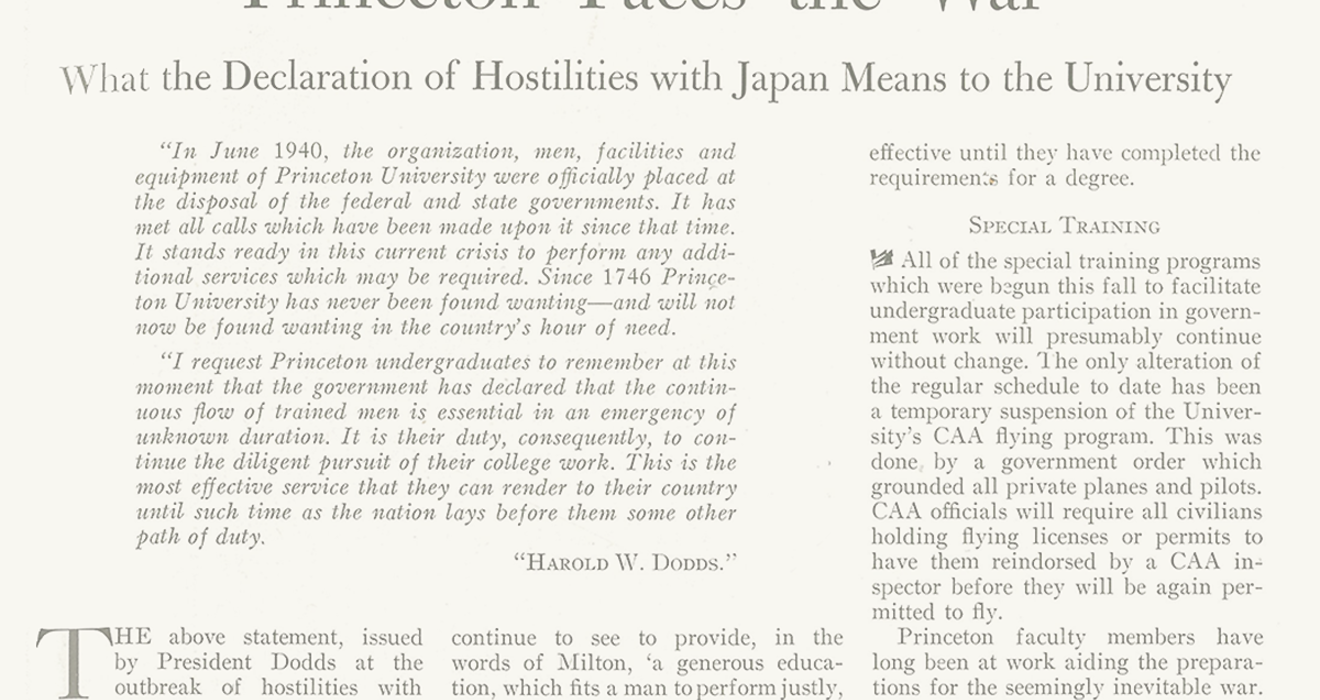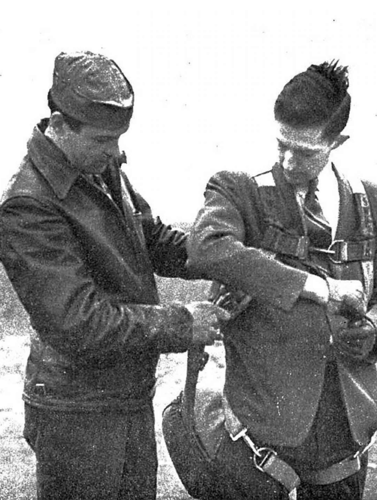
The following story was originally published in PAW’s Dec. 12, 1941, issue, five days after the attack on Pearl Harbor.
“In June 1940, the organization, men, facilities and equipment of Princeton University were officially placed at the disposal of the federal and state governments. It has met all calls which have been made upon it since that time. It stands ready in this current crisis to perform any additional services which may be required. Since 1746 Princeton University has never been found wanting — and will not now be found wanting in the country’s hour of need.
“I request Princeton undergraduates to remember at this moment that the government has declared that the continuous flow of trained men is essential in an emergency of unknown duration. It is their duty, consequently, to continue the diligent pursuit of their college work. This is the most effective service that they can render to their country until such time as the nation lays before them some other path of duty.”
— Harold W. Dodds
The above statement, issued by President Dodds at the outbreak of hostilities with Japan, summarizes the spirit with which the University, faculty and undergraduates alike, rallied to the call for united action — “Since 1746 Princeton University has never been found wanting, and will not now be found wanting in the country’s hour of need. …”
Princeton, as you will remember from previous articles published in the Weekly, began its 195th year this fall already prepared to play its part in National Defense. It is now equally prepared to do its utmost for the sake of National Offense, and at the same time, as President Dodds has said, “to continue to see to provide, in the words of Milton, ‘a generous education, which fits a man to perform justly, skillfully, and magnanimously, all the offices, both private and public, of peace and war.’”
Princeton began its 195th year prepared to play its part in National Defense. It is now equally prepared to do its utmost for the sake of National Offense.
It is undetermined at the present time whether there will be any change in the status of undergraduates enrolled in the R.O.T.C. unit. As far as is known now there will be none. The future of those seniors holding commissions in the army or marine corps is also undetermined. It is unlikely, however, that undergraduates holding ensigns’ commissions in the navy will be called before graduation, inasmuch as their commissions will not become effective until they have completed the requirements for a degree.
SPECIAL TRAINING
All of the special training programs which were begun this fall to facilitate undergraduate participation in government work will presumably continue without change. The only alteration of the regular schedule to date has been a temporary suspension of the University’s CAA flying program. This was done by a government order which grounded all private planes and pilots. CAA officials will require all civilians holding flying licenses or permits to have them reindorsed by a CAA inspector before they will be again permitted to fly.
READ MORE: The Day That Changed Everything
Princeton faculty members have long been at work aiding the preparations for the seemingly inevitable war. By the end of last year one out of every three members of the University teaching staff had taken on some specific task in the national program, and the number has been steadily increasing ever since. Twelve different projects have been assigned to Princeton by the National Defense Research Committee in Washington on behalf of the army and navy. Probably no other institution, in proportion to size and resources, has been given a greater number of such projects — all of which relate to devices and mechanism of warfare.
But, as for the actual spirit of Princeton at this critical time, it can be no better expressed than by the following editorial which appeared in the Princetonian on the morning after Japan’s initial attack:
DAWN OVER ARMAGEDDON
Dawn came up like thunder in the Pacific today as the flames which have been rising from a portion of the earth’s surface since 1939 finally spread virtually to the last unburned portion, leaving the world in the grip of a holocaust too gigantic to contemplate.
On Saturday night — a long time ago now — Herbert Agar at the Prince banquet was decrying the hypocrisy of “national defense” and “aid to Britin” as being merely a cowardly expression of reliance of gallant foreigners to fight for all that Americans consider worth while. He was lashing at the unwillingness of Americans to fight their own battle.
Yesterday the United States had its mind made up for it — by Japan. Clear-cut aggression into American territory at Guam and Hawaii left the country no choice but the declaration of war which will undoubtedly come today. British and probably Russian war declarations on Japan will follow.
WHAT IT WILL MEAN
The implications of the expected American declaration will be far-reaching. It will put the nation on a complete war basis, and will subordinate the settling of domestic quarrels to the more immediate business of prosecuting a war. It will mean the dissolution of America First and Fight for Freedom alike, as the nation is at last compelled into a unity of purpose under the commander-in-chief of the army and navy, Franklin D. Roosevelt.Whether it will mean open war between the United States and Germany tomorrow, next week or next year is a side issue. What is important is that it will mean the United States has joined the belligerents on the side of democracy in the Armageddon that lies ahead. Ultimate conflict with Germany is completely inevitable.
IMMEDIATE DUTY: KEEP COOL
What is the immediate meaning of all these history-making, terrifying happenings to Princeton University? The undergraduate anxious to do his full share of duty as quickly as possible, is bound to be confused as to what that duty consists in.
President Roosevelt has said, and President Dodds reiterated last night, that the patriotic duty of college students is to continue conscientiously with their present work unless they are actually called into active service. The tremendous need for trained minds, both during and after the war, makes present continuance of the business at hand far more valuable than an immediate hysterical enlistment.
The greatest danger, and the thing most necessary to be avoided, is the temptation to adopt the fatalistic, devil-may-care attitude that you read about as being the “war spirit.” The idea of throwing up everything to pursue a life of reckless pleasure until the inevitable arrives, represents almost treason in a time when civilization totters on the brink of doom.







No responses yet